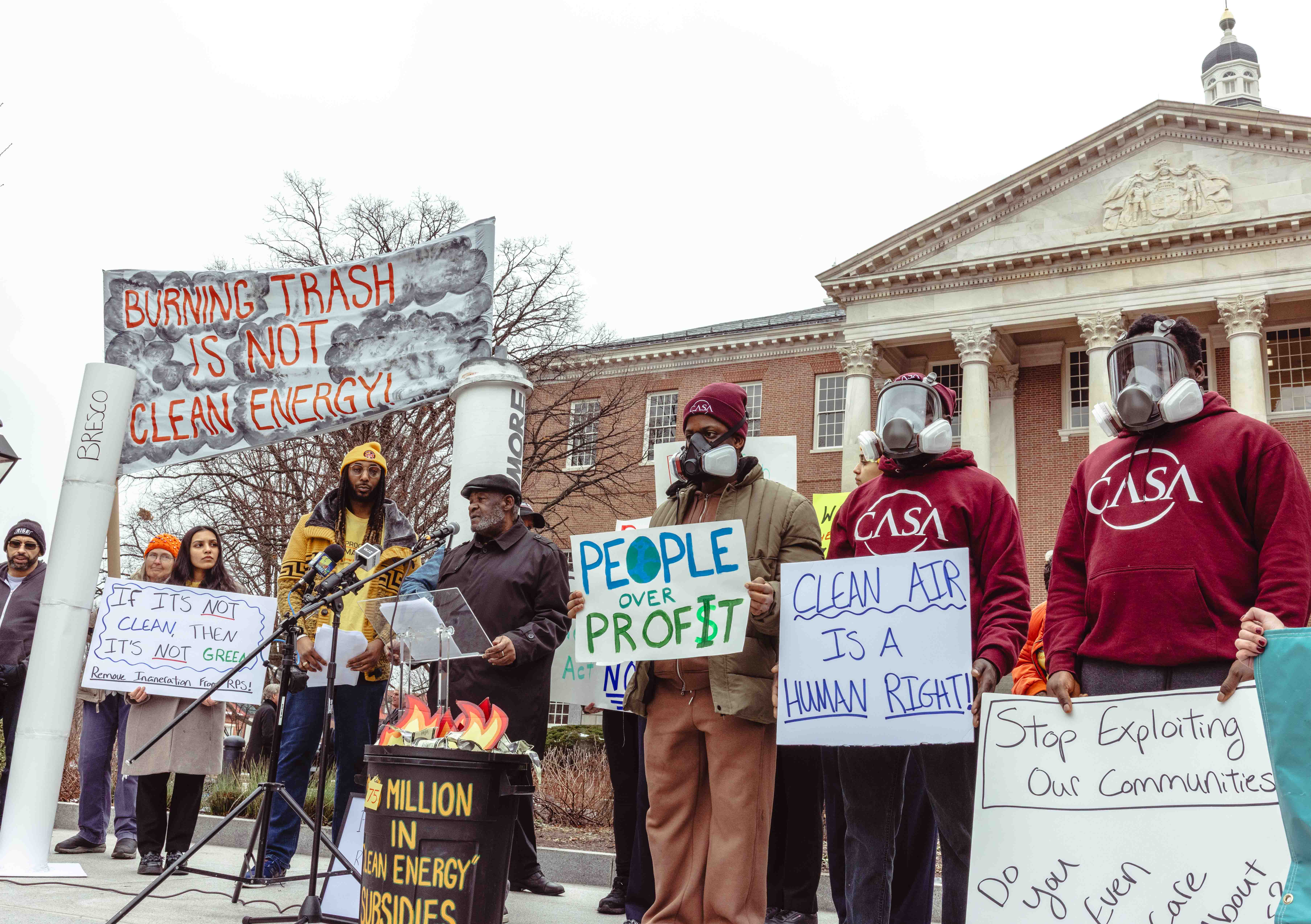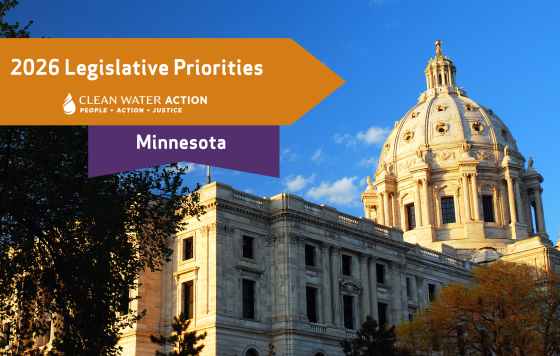
Today, we're testifying in support of HB220/SB10, the Reclaim Renewable Energy Act - long-overdue environmental justice legislation to stop subsidizing trash incinerators as "renewable energy." Check out this testimony signed by 78 organizations, download our technical testimony for more policy details, and contact your legislators to support the Reclaim Renewable Energy Act today!
78 Organization Sign On Testimony
Supporting HB0220
House Economic Matters Committee
February 20, 2025
Position: FAVORABLE
Dear Chair Wilson and Members of the Committee,
The undersigned 78 community organizations; climate, environment, environmental justice, and economic justice groups; and businesses urge you to pass the Reclaim Renewable Energy Act to eliminate trash incineration from Maryland’s Renewable Portfolio Standard and make tens of millions of additional dollars per year available to support renewable energy at no cost to the state budget.
Trash incineration is neither clean nor renewable energy. Trash incineration is among the dirtiest methods of producing electricity. A 2023 study in PLOS Climate found that “incinerators emit more greenhouse gas emissions per unit of electricity produced than any other power source” - even coal plants. Incinerators emit mercury, lead, particulate matter 2.5 and 10, sulfur dioxide, nitrous oxide, and carbon monoxide, all of which pose significant dangers to public health. Including trash incineration in Maryland’s RPS does not deliver clean or renewable electricity to Marylanders. It only profits companies that pollute our communities.
Maryland is wasting an increasing amount of RPS money on trash incineration, and must fix the problem before expanding the RPS. Subsidies to trash incinerators through Maryland’s RPS have ballooned from $11.5 million in 2020 to $24.3 million in 2023 - a cumulative $75.4 million in 4 years. These subsidies go to the ReWorld incinerator in Lorton, VA, the ReWorld incinerator in Montgomery County, and the WIN Waste incinerator in Baltimore City, all of which operated for decades before receiving this subsidy and do not rely on it to operate. This trend of increasing subsidies makes it especially urgent to eliminate trash incineration from the Renewable Portfolio Standard before any measures to increase the program’s mandate for renewable energy.
Passing HB220 will make more money available for renewable energy at no cost to the state budget. As Maryland faces budget cuts, we must ensure we put money we are already spending to its best use. When Maryland passes HB220, utilities currently using incinerator RECs for Maryland RPS compliance will purchase RECs from energy sources that remain eligible for the RPS (meaning more clean energy will be supported by Maryland’s RPS) or pay Alternative Compliance Payments (funding that Maryland code designates for low-income renewable energy projects). In either case, that’s better than throwing money away on incineration.
Forcing ratepayers to subsidize incinerators is an environmental and economic injustice. Passing HB220 will not negatively impact ratepayers. While trash incineration is included in the Renewable Portfolio Standard, ratepayers are forced to subsidize incineration through their utility bills. Nearby residents harmed by pollution from incinerators are forced to subsidize and incentivize the facility harming them. Passing HB220 will end this economic injustice, and according to the fiscal note will not raise rates.
Impacted communities and local governments support HB220. Communities impacted by existing or proposed trash incinerators in Baltimore City, Montgomery County, Frederick County, and Carroll County have advocated for nearly a decade that trash incineration has no place in Maryland’s Renewable Portfolio Standard. This year, Baltimore City Mayor Brandon Scott announced that the Reclaim Renewable Energy Act is among the Baltimore City Administration’s Supported Legislation. As local governments, businesses, and communities work to transition away from trash incineration and build healthier waste management infrastructure, the state government subsidizing and incentivizing incineration holds this work back.
Please pass the Reclaim Renewable Energy Act in 2025, invest more money in real renewable energy at no cost to the state budget, and end this longstanding environmental and economic injustice of calling trash incineration clean energy.
Sincerely,
Mid-Atlantic Justice Coalition
Walkiria Pool, Co-Anchor
South Baltimore Community Land Trust
Greg Sawtell, Zero Waste Just Transition Director
Sugarloaf Citizens Association
Steven Findlay, President
Clean Water Action
Jennifer Kunze, Maryland Organizing Director
Zero Waste Montgomery County
Susan Eisendrath, Chair
Progressive Maryland
SirJames Weaver, Environmental Justice Organizer
Food & Water Watch
Jorge Aguilar, Southern Region Director
Maryland League of Conservation Voters
Rebecca Rehr, Director, Climate Policy & Justice
SB7 Coalition
Michael Middleton, Executive Director
Community of Curtis Bay Association
David Jones, Edith Gerald, Mandy Memmel, Kellie Gaither, Angie Shaneyfelt, Cara Jones, Tiffany Thompson, Meleny Thomas, Greg Sawtell, Karen Mull: Community of Curtis Bay Association Board
League of Women Voters of Maryland
Linda Kohn, President
Chesapeake Climate Action Network
Brittany Baker, Maryland Director
Matthew Henson Community Development Corporation
Dr. Marvin L. Cheatham, Sr, C.E.O.
Neighborhood Sun
Gary Skulnik, Chief Executive Officer/Founder
Compost Crew
Ben Parry, CEO
Community Development Network of Maryland
Claudia Wilson Randall, Executive Director
Sierra Club Greater Baltimore Group
Deborah "Spice" Kleinmann, Chair
Maryland Legislative Coalition - Climate Justice Wing
Dave Arndt, Co-Chair
Cedar Lane Unitarian Universalist Environmental Justice Ministry
Lee McNair, Member
Maryland Legislative Coalition
Cecilia Plante, Co-Chair
Sustainable Hyattsville
Greg Smith, Board Member
Unitarian Universalist Legislative Ministry of Maryland
Phil Webster, Lead Advocate for Climate
350.org
Taylor Smith-Hams, US Senior Organizer
Namati
Jay Monteverde, Senior Advisor, US Environmental Justice Program
Centro de Apoyo Familiar
Valeria Menjivar, Healthy Families Assistant
Gwynns Falls Community Association
Christopher Schulze, President
Friends of Sligo Creek
Kit Gage, Advocacy Director
Indivisible HoCoMD Environmental Action
Peter Alexander, Co-Facilitator
Baltimore Jewish Council
Abby Snyder, Director of Government Relations
Echotopia LLC
Diane Wittner, Principal
Coal Kills Baltimore
John Scheinman, Co-Founder
HoCo Climate Action
Liz Feighner, Steering Committee
Baltimore 350
David Neun, Founder
Maryland Catholics for Our Common Home
Bob Simon, Member, Organizing Committee
Iglesia Manantiales de Agua Viva
Jose Ayala, Minister
Interfaith Power & Light (DC.MD.NoVa)
Andrea Orozco, Advocacy Lead
ACQ (Ask the Climate Question)
Karen Metchis, Chair
Chesapeake Bay Foundation
Matt Stegman, Maryland Staff Attorney
CASA
Jose Coronado Flores, Climate Policy Analyst
Reconnecting Communities in West Baltimore Coalition
Min. Glenn Smith, President
Mobilize Frederick
Kathy KInsey, Chair, Government Affairs Committee
Montgomery County Faith Alliance for Climate Solutions (MC-FACS)
Stuart Simon, Advocacy Lead
Montgomery Countryside Alliance
Caroline Taylor, Executive Director
National Aquarium
Maggie Ostdahl, Senior Conservation Policy Manager
Concerned Citizens Against Industrial CAFOS (CCAIC)
Gabby Ross, Founder
Maryland Latinos Unidos
Carlos Orbe, Jr, Communications and Public Affairs Specialist
Climate Communications Coalition
Sonia Demiray, Executive Director
Envision Frederick County
Patrice Gallagher, Board Vice Chair
Blue Water Baltimore
Alice Volpitta, Baltimore Harbor Waterkeeper
Beaverdam Creek Watershed Watch Group
Tom Taylor, Co-Chair
Chesapeake Physicians for Social Responsibility
Gwen L. Dubois MD, MPH, President
Institute for Local Self-Reliance
Brenda Platt, Director, Composting for Community Initiative
Environmental Justice Maryland
Zack Buster, Founder & Executive Director
Coal Free Curtis Bay
Andrew Hinz, Volunteer
Earthjustice
Susan Miller, Senior Attorney
Third Act Maryland
Cynthia Miller, Co-facilitator
Green Sanctuary, Unitarian Universalist Church of Silver Spring
Doneby Smith, Liaison to the Montgomery County Climate Coalition
Potomac Riverkeeper Network
Betsy Nicholas, Vice President of Programs and Litigation
The Climate Mobilization Montgomery County
Karl Held, TCM Steering Committee member
1199SEIU United Healthcare Workers East
Ricarra Jones, Political Director
High Note Consulting, LLC
Michael Dalto, President
Maryland Energy Advocates Coalition
Laurel Peltier, Chair
Center for Progressive Reform
Bryan Dunning, Senior Policy Analyst
Charm City Land Trusts
Cheryl Bryant, Executive Director
Climate Reality Greater Maryland
Frances Stewart, Chapter Chair
Elders Climate Action Maryland
Frances Stewart, Chapter Co-leader
Mountain Maryland Movement
Ann Bristow, Spokesperson
Out for Justice, Inc.
Trina Selden, Executive Director
Waterkeepers Chesapeake
Robin Broder, Acting Executive Director
Vernal Pool Partners
Mark Southerland PhD, Director
Safe Skies Maryland
Mark Southerland PhD, Legislative Director
Baltimore Phil Berrigan Memorial Veterans For Peace
Ellen E Barfield, Co-founder and Coordinator
Fellowship of Scientists and Engineers
Elizabeth Law, P.E. (retired), Chair
Baltimore Transit Equity Coalition (BTEC)
Samuel Jordan, President
The Crow’s Nest
Leonardo Martinez-Diaz, Founder and Director
Beaverdam Creek Watershed Watch Group
Tom Taylor, Co-Chair
Sunrise Movement Baltimore
Yara Changyit-Levin, Hub Delegate
Beyond Extreme Energy
Andrew Hinz, Volunteer


